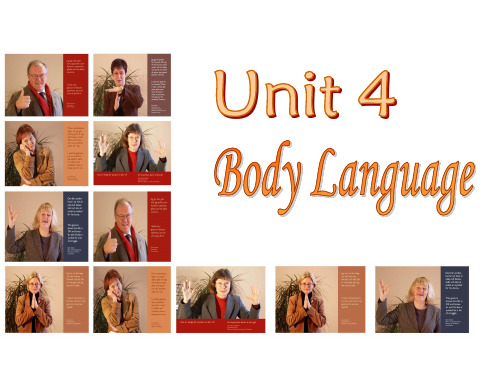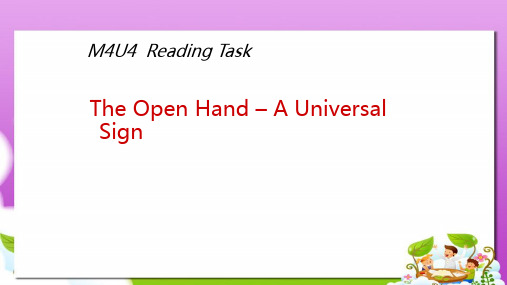人教版高中英语必修四unit4Reading PPT 课件
高中英语必修四4_Unit4_Body_language_Reading新人教版

A conclusion of the passage.
Careful reading
( Read para1-2 Find out the answers to the questions)
1 Who will be present at the meeting?
people from different countries
a Japanese The second mistake
George Cook from (Canada)
He ________ bowed to Mr. Cook and his nose touched Mr. _________ moving Cook’s _______ ________. hand He ________ reached his hand ________ _______ ________ to the out Japanese.
Para.1-2 (example)
people present local businessmen
people representing the Chinese government
2 Why are people visiting China?
purpose mistakes
interest
People from different countries misunderstand each other.
He approaches Ms Smith Mr. Garcia by touching _______ ______ her from The _________ _______ shoulder and kissing (Columbia ) first her on the ________. cheek mistake She ______ stepped ________ back Julia Smith appearing surprised _________ from and take a few steps (Britain) away from _______ ______ Mr. Garcia.
人教版高中英语必修四 Unit4 Body Language reading 课件

Para1 Body language is one of the most powerful means of communication, often even more powerful than spoken language. People around the world show all kinds of feelings, wishes and attitudes that they might never speak aloud. It is possible to "read" others around us, even if they do not intend for us to catch their unspoken communication. Of course, body language can be misread, but many gestures and actions are universal.
but many gestures and actions are universal. Para7 With so many cultural differences between people, it is great
to have some similarities in body language. We can often be wrong about each other, so it is an amazing thing that we understand each other as well as we do!
Para7 With so many cultural differences between people, it is great to have some similarities in body language. We can often be wrong about each other, so it is an amazing thing that we understand each other as well as we do!
人教版高中英语选择性必修第四册精品课件 Unit 4 SHARING Section C

Task 2 Reading for the main idea 1.What’s the main idea of the passage?
It is worthwhile to help others as a volunteer.
2.Read the text again and match each paragraph with its main idea.
B.Many dangerous diseases are rare in Tanzania.
C.The country is quite beautiful and many of the people are quite rich.
D.Some Tanzanians with a heart condition even died without medical
【掌握构词规律 快速记牢单词】 后缀-ion 常用于字母t结尾的动词之后构成名词,如: infect→infection 感染 select→selection 挑选 elect→election 选举 collect→collection 收集
Ⅱ.重点短语
1. take for granted
Step Two While-reading Task 1 Skimming for the main structure
1.worthwhile 2.volunteered 3.bonds 4.left 5.terrible 6.changed 7.what 8.responsible 9.volunteer 10.pray
2. contract
vt.感染(疾病);与……订立合同(或契约) n.合同;契约
3. relay
新课标人教版高中英语必修四 Unit 4 Body language-communication no problemReading课件

puzzling/confused amazing/surpried
crazy/very sad/unhappy
What do these faces mean?
grievous/sad complaint
happy/shy
What do these faces mean?
amusing/happy laugh at
(para. 5)
students
• Careful reading para1
• Judge the following sentences T or F
• 1. Yesterday, another student and I, representing our university's student association, went to the Capital International Airport to meet this year's international students. T
__g_e_s_tu_r_e_s_, and__p_o_s_t_u_r_e_s_,
or the
ways you stand, are different kinds of body
language.
Let's play game !
• guess
what is he/she doing ?
Some body languages are different in different countries.
1. Is the author of this passage a man or a woman? How do you know?
A man Ahmed Aziz did not shake hands with women, but he shook with the author.
人教版高中英语选择性必修第四册精品课件 Unit 4 SHARING Section A

Activity 2 Read the text again and match each paragraph with its main idea. Para.1 A.The hard trip to Tombe’s village. Para.2 B.The learning conditions in the school. Para.3 C.The bush school for local students. Para.4 D.Feeling nice to get mail. Para.5 E.The dinner in Tombe’s home. Para.6 F.Their belief about leftover food. Para.7 G.The feeling about the trip. Para.8 H.Tombe’s housing.
3.Why did Tombe throw out of the tin can? A.Because he hated the leftover food. B√.Because he believed leftovers attracted evil spirits. C.Because he believed the can had no use at all. D.Because this is a way for people in Papua New Guinea to store leftovers. 4.How did Jo feel after the visit to Tombe’s family? √A.Happy. B.Sad. C.Worried. D.Upset.
高中英语人教版必修四unit4_Body_language-reading公开课课件ppt课件

Part 3: (Para 4 )
Part 4: (Para 5)
D) Examples of learned or cultural “body language”.
Matching the people and the different ways of greeting (para2&5)
Tony Garcia (Columbia) Julia Smith (Britain) Akira Nagata (Japan) George Cook (Canada)
Careful reading :
shakes hands and kisses others twice on each cheek Bows
shakes hands approaches others closely and touches their shoulder and kisses them on the cheek does not stand very close to others or touch strangers
Columbia
Britain
Julia Smith
George Cook Akira Nagata
Canada
Japan Jordan
Ahmed Aziz
Darlene Coulon
You
France China
Fast reading:
Which is the main idea of the text?
reading
Come here !
Good ! / Great !
“No,You can not do that"
OK
• She is deaf and dump, so body languagee.
【单元课件】人教版(2019)新教材高中英语选择性必修第四册第四单元词汇学习PPT

1)I just got a parcel from home! 2)There is a parcel of clothing and
some letters for you. 3)She has parcelled up all the books
on the bookshelf.
jam
traffic jam
1)The teachers, not to mention the students, were confused about the maths problem.
2)He has two big houses in this country, not to mention his villa(别墅) in France.
2. jam [dʒæm]: n. 果酱; 堵塞 a traffic jam: 交通堵塞; 堵车
1)It was so nice to get some sweets and jam from home.
2)The fruit can be made into jam. 3)Her car was delayed in
a three-mile traffic jam. 4)We were stuck in a traffic jam
yesterday morning.
3. mail [meɪl]: n. 邮件; 信件; 邮政 (US)
vt. 邮寄; 发电邮给
post : n. 邮政; 邮递; 邮寄; 邮件 (UK)
3)All other considerations are secondary to his safety.
4)Raising animals was only secondary to other forms of farming.
最新人教版高中英语必修四Unit4_body_language_reading精品ppt课件

I’m very excited.
Welhe following facial expressions ?
surprised astonished
shy
happy
When people meet each other…
In Russia, France and Arab countries men kiss each other.
姿势;手势
Do you know the meaning of the following gestures ?
Stop!
Come It’s ok. You are very here. good. Bye-bye. / Well done!
Do you know the meaning of the following body movements ?
George Cook (Canada)
a Japanese Julia Smith (Britain)
Mr. Garcia (Columbia)
Listen to the tape and match the main idea of each part with lines. Part 1. Different people have different (Para.1) body language. Part 2. Summary of body language. (Para. 2~3) Part 3. (Para. 4) Meet the visitors at the airport.
Find out the two cultural mistakes in Para2:
The first mistake Tony Garcia (Columbia ) Julia Smith (Britain) George Cook The second mistake (Canada) Akira Nagata (Japanese)
Unit 4 Reading for Writing语言点(课件)高中英语人教版选择性必修第四册

14
5. Today, I want to relay to you that I'm proud of the work my mother has done, and I am now supportive of it.
今天我想告诉你们的是,我为我妈妈所做的工作感到骄傲,我现在也
我母亲还到农村巡 回治疗,帮助残疾人,为当地医生提供咨询和 培训。
n. 咨询;咨询会
consult vt.咨询;请教;查阅;商量 ✓concosunlstualnttsbn.. a顾b问ou;t/高on级s顾th问. 关医于师某,事会请诊教医/师咨;询咨某询人者 ✓ consult with sb about/on sth. 与某人协商某事 ✓ consult the dictionary 查字典 ✓ consult....for... 为······查阅(词典、参考书等)
is wet.
③ ____A__s____it was late, we came back soon. ④ We can't go out______b_e_c_a_u_s_e_____ it is too cold.
单句语法填空 Exercise
1. She__h_a_s_r_e_tu_r_n_e_d__(return) from India lately.
我们都想当然地认为他们已经完成了他们的任务。
3) Human beings __to_o__k_it__fo_r_g_r_a_n_t_e_d__ (以为它理所当然) that their brains held all the solutions, but maybe their hearts can be a better guide.(2019江苏高考)
人教版高中英语必修四 Book 4 Unit 4 Showing Our Feelings PPT课件

Task 1 complete the passage
Body language is used by people to _______ their thoughts and opinions and express to______________ communicate with each other. When you talk with others, you are not just using words, but also using facial expressions as well as ________. gestures Just like words, body language _______ varies from culture to culture.
to show no interest to the person
6. standing, holding your arms across your chest
to protect yourself from an unwanted conversation
similar body language
Unit 4 Showing Our Feelings
1. What is the main idea?
Body language has many universal gestures.
2.Does the smile always mean happiness?
A smile usually show happiness and put people at ease.
让步状语 从句, 此句是复合句。even if 引导_________ 其中主句 中it 作 形式主语 ________,真正的主语为 to “read”others around us 。 _____________________________ “__________________________________ 读懂”我们周围的人的意思是有可能的, 句意为: 即便是人们并不想让我们捕捉到他们没有说 _________________________________________ 出来的信息。 _______________________
高中英语必修四unit4公开课课件

Step 3: Post reading
Do you know?
surprise
anger
fear happy
恐惧
sorrow
悲伤
disgust 厌恶
contempt 轻视
posture
What are they trying to tell us?
I don’t know!
Me?
I’m listening carefully! Pray/ Please!
Nice to meet you!
Male. Ahmed Aziz will usually not touch women, but he shakes hands with the author and stand quite close to the author to talk.
Para. 4
True (T) or False (F).
Para. 2
Find out the two mistakes the writer found in the
airport:
Tony Garcia from C__o_lu_m__b_i_a_
He approached Julia, _to_u_c_h_e_d_h_e_r_s_h_o_u_ld_e_r_
1. All cultures don’t greet each other the same
高中英语必修四unit4Reading

Unit 4 Reading Communication: No problem?
Brainstorming
1. What is the purpose of language? The purpose of language is to communicate with other people.
1. Englishmen often stand close to others or touch strangers as soon as they meet. F
2. Most people around the world F now greet each other by kissing.
George Cook (Canada)
Julia Smith (Britain)
Tony Garcia (Columbia)
First-reading
I. While reading, please try to divide the whole passage into several parts and find out the main idea. Part 1. (Para. 1) Meet the visitors at the airport.
Part 4. (Para. 5) Summary of body language.
II. How do different international students behave when they greet people? Complete the chart with information from the passage.
3. There are many different ways to greet someone using words. How many ways can you think of to greet someone if you cannot speak?
高一英语必修四_unit4__reading课件

Unit 4 Body language •What do you think the purpose of language?•How can you communicate with someone if you cannot speak?•How many ways can you think of to greet someone if you cannot speak?Communication: No problem?•Step1. fast reading•1) What is the main idea of the text?2) How many parts can we divide the passageinto?3) What’s the main idea for each part?•1) What is the main idea of the text?–The passage introduces some examples of cultural body language when greetingpeople.•2) How many parts can we divide the •passage into?–Part 1 (para. 1)–Part 2 (para. 2 and 3 )–Part 3 (para. 4 and 5 )3) What’s the main idea for each part?Part 1 (para. 1)We are sent to Capital International Airport to meet some international students.Part 2 (para. 2 and 3)Examples of learned or cultural “bodylanguage”.Part 3 (para. 4 and 5)Different people have different physical ways to greet others. Learning about their customs can help avoid difficulties in communication.Step 2. Scan the text and find outCountry / Area Ways to greet each otherBritain Shake hands. Do not stand very close to others or touchstrangers when they meet.Canada Shake hands.Japan Bow.Spain, Italy, SouthAmerican countriesApproach others closely and are more likely to touch them. France Shake hands and kiss each other twice on each cheek.Middle East, some Muslim countries Shake hands and stand quite close to other men. Nod to women but do not shake hands with them.Name Description Body language To whom Tony Garcia man from Colombia Kiss on the cheek everyoneJulia Smith woman from Britain no touching everyoneAkira Nagata man from Japan bowing everyone George Cook man from Canada shaking hands everyoneAhmed Aziz man from Jordan shaking handsnodding to manto womanDarlene Coulon woman from France shake hands and kisstwice on each cheekpeople she knowsStep 3. use the passage to help you answer the following questions1) Is the author of this passage male or female? How doyou know?The author is male. Ahmed Aziz will not shake hands with women, but he shakes hands with the author.2) What were the two mistakes that the author noticed?He noticed that the Colombian man kissed theBritish woman, but in her culture, a kiss from astranger is not expected. He also noticed that theJapanese man bowed just as the Canadian manstarted to shake hands, so one man’s nosetouched the other man’s hand.•3)Who seemed to prefer to keep more physical diastance from others? Who seemed to prefer closer physical distance ?•The British woman, Julia and probably the Canadian man, George, seemed to prefer to keep more physicaldistance from others. The Colombian man, Tony, and the Jordanian man Ahmed, seemed to prefer closer physical distance.•4) Did any students have similar greeting customs? If so, which one?•Yes. Tony from Colombia and Darlene from France had a similar greeting custom —a kiss. George from Canada and Ahmed from Jordan also had a similar greeting custom —a handshake, but Ahmed shakes hands only with men.•5) “When in Rome, do as the Romans do.”What do you think this famous saying means?•This saying means that when we are in a certain place, we should follow the customs of the people who live in that place, not our own customs.•6) Do you agree with the author’s statement that body language is not good or bad? Why or why not?Step 4. summaryStep 5. translation1.The first person to arrive was TonyGarcia, closely followed by Julia Smith from Britain.2. Not all cultures greet each other thesame way, nor are they comfortable in the same way with touching or distance between people.3. However, people from places like Spain,Italy or South American countriesapproach others closely and are morelikely to touch them.Step 5. homework •Complete p.27 Exercise 3。
人教版高中英语必修四课件-Unit 4 Body Language P-1PPT课件

Person & country
Suitable greeting
a man from Canada To M: Shakes hands.
To F: Shakes hands or kisses on
Both cheeks if known.
a woman from France To M: Shakes hands or kisses
• 2. What parts of the world are not represented by the visitors?
Africa, Australia and Central America.
• 3. Why is Julia Smith surprised?
Julia Smith is surprised that Mr Garcia touches her shoulder and kisses on the cheek when they meet.
They shake hands & kiss each other twice on each cheek.
• 6. Is the main character male or female?
How do you know?
From the 5th paragraph we know that there are only two women, one is Julia Smith, the other is Madame Coulon, so the main character must be a man.
7 I’m very nervous. 8 I’m tired &sleepy.
Patting or rubbing stomach. Hanging head. Smiling, arms open and head back.
高中英语人教版必修四_Unit4_Body_language_Reading (2)ppt课件

Make the list of feelings and act it out
Meaning
1. You are welcome. ●
2. I am worried 3. I ate too much!
Action 1. A smile and a handshake
2. Twisting hands together or
local businessmen people representing the Chinese government
2 Why are people visiting China?
purpose
interest
3 what does the word mistake mean?
mistakes
People from different countries
Body language varies from culture to culture. Not all members of all cultures behave the same way.
We should try to master and respect each other’s
culture in order to make good communication.
Find out the two mistakes the writer found in the airport:
The first mistake
Mr. Garcia from (Columbia )
Julia Smith from
(Britain)
He approaches Ms Smith by ___t_o_u_c_h_in_g____ __h_e_r_____ and _s_h_o_u_l_d_erher on the _k_i_s_s_in_g__.
人教版高中英语必修四Unit 4《Body language》ppt公开课课件

Think about it!
What can we do to avoid misunderstanding caused by ways of greeting between people from different cultures?
1. Be friendly and understanding.
编者语
• 要如何做到上课认真听讲?
•
我们都知道一个人的注意力集中时间是有限的,一节课45分钟如何保持时时刻刻都能认真听讲不走神呢?
•
1、往前坐
•
坐的位置越靠后,注意力就越难集中。老师不会注意到你的事实可以让你不再紧张,放心去做别的事情。坐在后面,视线分散,哪怕你是在看老师,如果有人移动,你的视线就会飘到那个同学的后脑勺上去,也就无法集中注意力。 而且,坐在后面很
•
2、不要看书,要看老师的眼睛
•
只要老师不是在一味地读教材,那老师的“话”就不可能和你低头看着的教材上的“文字”一致。头脑聪明的学生,也许能做到既集中精神听老师的话,又集中精神看眼前书上的内容。可是实际上大部分的学生都做不到这一点。
•
认真听讲的第一个阶段就是上课时间无条件地“往前看”,上课的时候看书往往很容易开小差。摒除杂念,将视线从摊在眼前的书上移开。老师讲课的时候只看前面,集中注意力听老师嘴里说出来的话,那才是认真听讲的态度。
2. Always wear a smile when greeting, for its something universal.
3. Combine spoken language and unspoken language to communicate better.
- 1、下载文档前请自行甄别文档内容的完整性,平台不提供额外的编辑、内容补充、找答案等附加服务。
- 2、"仅部分预览"的文档,不可在线预览部分如存在完整性等问题,可反馈申请退款(可完整预览的文档不适用该条件!)。
- 3、如文档侵犯您的权益,请联系客服反馈,我们会尽快为您处理(人工客服工作时间:9:00-18:30)。
To Whom everyone
Julia Smith
woman from Britain
no touching
everyone
Akira man from Nagata Japan
bowing
everyone
Name Description Body
To Whom
Language
George man from Cook Canada
Ways to greet each other
Approach others closely and are more likely to touch them. Columbia Bow Japan Shake hands. Canada Shake hands and stand quite close to other men. Nod to women but do not shake hands with them. Jordan Countries: Japan , Jordan , Columbia, Canada
1. What did the writer go to the Capital International Airport for yesterday? B
A. To see off his friend. B. To meet international students. C. To buy a flight ticket. D. To meet some visitors coming from
A. nod heads and wave hands to girls B. touch others’ heads when they first
meet C. kiss each other twice on each cheek
when they are introduced to others D. stand quite close to other men when
a Japanese
George Cook (Canada)
Julia Smith (Britain)
Mr. Garcia (Columbia)
Complete the chart.
Name
Tony Garcia
Description
man from Colombia
Body Language
kiss on the cheek
Unit 4 Body language
Reading
Pre-reading
What do you think is the purpose of language?
To communicate with each other.
How can you communicate with someone if you cannot speak? Give an example.
8. Who seemed to prefer to keep more physical distance from others? Who seemed to prefer closer physical distance?
8. It’s necessary to study body language because it helps us to get better understanding among people from different cultures. T
Choose the best answer.
The
from
first
(Columbia)
mistake
Julia Smith from
(Britain)
He approaches Ms Smith by t_o_u_c_h_in_g_ _h_er__ _sh__o_u_ld_e_r__ and _k_is_s_e_d_ her on the _c_h_e_e_k___. She s_t_e_p_p_e_d_ b__a_ck___ appearing _su_r_p_r_i_s_e_d_ and take a few steps __a_w_a_y__ _f_r_o_m__ Mr. Garcia.
Part 3: Different people has different (Para 4) body language. Part 4: Summary of body language. (Para 5)
Careful Find out the two mistakes.
Mr. Garcia
5. Can we expect people everywhere to act the same? Why?
No. Because people from different culture or countries act quite differently sometimes.
6. Is the author of this passage male or female? How do you know?
shaking hands
everyone
Ahmed man from shaking hands to men
Aziz Jordan
nodding to women
Darlene woman Coulon from France
shake hands and kiss people she
twice on knows each cheek
Divide the passage into several parts and find out the main idea.
Part 1: You are sent to CIA to meet this (Para 1) year’s international students.
Part 2 Examples of learned or cultural (Para2-3) “body language”.
several countries.
2. Where is Tony Garcia from? C
A. Britain.
B. Japan.
C. Colombia. D. Canada.
3. From Paragraph 2 we know that
Japanese prefer to __A__ when they
smile
cry
happy
surprise
angry
fear
What do people in different countries usually do when meeting?
China, Britain: handshake
Japan: bow
Some western countries: hug
True or false?
1. Mr. Garcia kissed Miss Julia Smith because they have known each other well. F
2. George Cook reaches his hand out in order to shake hands with the Japanese. T
Definition of Body Language
One form of communication without using any words.
gesture
posture
eye contact
facial expression
What are the following facial expressions?
a Japanese
The second mistake
George Cook from
(Canada)
He _b__o_w_e_d__ to Mr. Cook and his nose __to_u_c_h_e_d__ Mr. Cook’s _m_o_v_i_n_g_ __h_a_n_d__.
He _r_e_a_c_h_e_d_ _h__is___ _h_a_n__d_ __o_u_t___ to the Japanese.
6. Men from all Muslin countries will not shake hands with women. F
7. From the passage we can see western cultures are better than eastern cultures. F
are introduced to others.
A. bow B. shake hands
C. kiss each other
D. touch others’ shoulders
4. According to the text, men from the Middle East often __D__.
The author is male. Ahmed Aziz will not shake hands with women, but he shakes with the author.
7. What were the two mistakes that the author noticed?
He noticed that the Colombian man kissed the British woman, but in her culture, a kiss from a stranger is not acceptable. He also noticed that the Japanese man bowed just as the Canadian man started to shake hands, so one man’s nose touched the other man’s hand.
